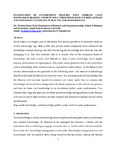EXAMINATION OF GOVERNMENT POLICIES THAT ADDRESS TACIT KNOWLEDGE SHARING AND HOW WELL THESE POLICIES HAVE BEEN APPLIED AND FORTIFIED TO ENHANCE PUBLIC SECTOR PERFORMANCE.
Abstract
Knowledge is an integral part of the factors that impact growth in an economy; more so
in this knowledge age. Both public and private sector enterprises have embraced the
knowledge concept, through not only harnessing the knowledge that abounds, but also
managing it as they also ascertain that it is shared. Out of the numerous facets of
knowledge, the most elusive and difficult to share is tacit knowledge, yet it highly
impacts performance of organisations. The public sector generates and is also exposed to
a lot of knowledge which in most cases is acquired but rarely shared. In the Kenyan civil
service, there seems to be ignorance in the following areas: the amount of knowledge
that flows through the Kenyan civil service every day, accounting for the knowledge that
the Kenyan civil servants require for present and future needs, how to acquire that
knowledge, the kind of knowledge that individual employees in the civil service possess
and how to share such knowledge so as to enhance public sector performance. This
situation then begs the question: are there tacit knowledge sharing policies in the Kenyan
civil service and if there are how are they applied and fortified to enhance public sector
performance?

